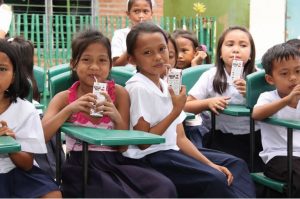2021: Blog – Providing access to safe and nutritious food for school children around world is central to the work of Tetra Laval
Providing access to safe and nutritious food for school children around the world is at the center of the work we drive at Tetra Laval Food for Development. And it hasn’t been more relevant than now. The world food system currently faces the double threat of a growing global population coupled with the COVID-19 pandemic. According to the United Nations, the global population is set to rise to more than 9,7 billion by 2050; today, some 821 million people are chronically undernourished. In order to feed the world in 2050, overall food production must increase by an estimated 50%. Reducing food loss and waste while developing sustainable food value chains is key to achieving this goal.

We believe the most effective way to tackle these global challenges is through collaboration with the relevant stakeholders. Since 1951, we are proud to participate in the development of school feeding and nutrition programmes through close cooperation with customers, governments, development agencies, funding organisations and NGOs. From sharing best practices used in school feeding worldwide, providing technical assistance and practical training to smallholder dairy farms, through to partnership development initiatives, to community engagement and empowerment, all of which are key pillars to sustainable programmes.
The first school milk programme using carton packages from Tetra Pak was introduced in Mexico in 1962 in collaboration with the National System for Integral Family Development, and is still reaching millions of children today. Today, more than 68 million children in 56 countries receive milk or other fortified beverages in Tetra Pak cartons at school.
On International School Meals Day, it’s important to remember the overwhelming impact that school feeding programmes (SFP) have on children – and wider communities – all over the world. Not only do they serve to improve children’s physical and mental health, but they also help to support local farmers and raise awareness of environmental issues. There are wider educational and societal benefits too. School enrolment and classroom attendance are known to increase at schools equipped with nutrition programmes. The World Food Programme (WFP) estimates that for every US$1 spent on a school feeding programme, between US$3 US$9 is gained in economic return.
Take the school feeding programme in the Dominican Republic for example. Together with the World Food Programme, LA-RAE, Tetra Pak and Tetra Laval Food for Development supported the improvement of quality control and food safety in the distribution chain. The government-funded programme reaches over one million children in the country and has been credited with offering 70% of the necessary nutrient requirements for school children in both rural and urban areas. According to a study by the Instituto Nacional de Bienestar Estudiantil (INABIE) and United Nations Development Programme (UNDP), cases of anaemia were reduced by over 24% in children 6-14yrs of age, while malnutrition decreased by more than 18%. In Kenya, schools that have a school milk programme have seen increases in enrolment rates of up to 55 percent in Nairobi County, 25 percent in Mombasa
County, 20 percent in Meru County and 14 percent in Embu County compared with schools without a programme. Meanwhile in Russia, research conducted at the Voronezh State Medical University in 2016 showed that children receiving hot meals and school milk have a better height index and suffer less from chronic conditions. The cases of diseases of the endocrine system and nutritional and metabolic disorders declined by 29%. In Thailand, the impact on the domestic dairy sector has also been very significant. By 2020, 40% of the total milk produced in the country was being used for the school milk programme.
This year’s theme – Eat for the Health of It – perfectly summarises the correlation between nutritious food and children’s physical and mental wellbeing. We must never underestimate the value of school meals and that message is perhaps more pertinent this year than ever before, as we continue to battle through the challenges of a global pandemic where millions of children are not getting access to nutrition. During the pandemic, we have learned invaluable lessons including the need for increased investments in health, education, and local agriculture development.
To highlight the positive benefits that school feeding programmes SFPs are bringing to children and communities worldwide, and to provide a clear, practical guide for those involved in programme implementation, we have created a School Feeding Handbook, which includes some of our global experiences and best practices, and can be found here.
Rafael Fabrega Director, Tetra Laval Food for Development


Leave a Reply
You must be logged in to post a comment.